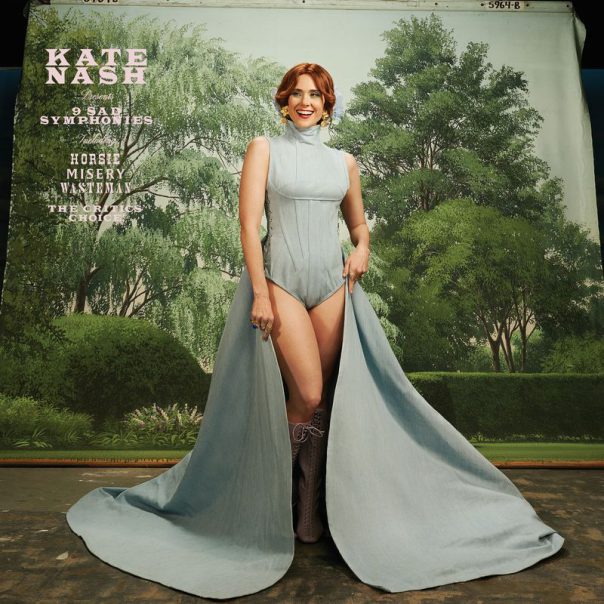ALBUM REVIEW: Kate Nash has a cry and finds her rainbow on ‘9 Sad Symphonies’

Kate Nash, “9 Sad Symphonies.”
Kate Nash finds her voice and sets boundaries in an impressive show of self-growth on her fifth album, 9 Sad Symphonies. A long way from her angsty 2007 debut, Made of Bricks, the English singer-songwriter wastes no time in walking listeners through her internal dialogue as she embraces newly gained perspectives that come with adulthood, as well as her reflections on her career and past relationships.
9 Sad Symphonies
Kate Nash
Kill Rock Stars, June 21
7/10
Get the album on Amazon Music.
She begins the 10-track album with “Millions of Heartbeats,” a track that sweetly draws you in with a lullaby-like melody on a piano and Nash’s vocals.
A song self-described as being about “losing one’s spark,” it mirrors the feeling of existential dread and is a nod to Nash’s political activism. “Everything you feel can just come undone/ And the media supports all the far right scum/ I just want to believe, but the feelings not inside me/ The sun has gone and so must I/ Do you think we’ll know each other when we die?” It steadily grows to a more upbeat tune with strings and handclaps, and ultimately draws back once more.
On single “My Bile,” the story continues on that trajectory by diving headfirst into Nash’s realization that she’s breaking toxic patterns and done adhering to society’s standards and perception of who she is. Rather than continue people-pleasing, she decides to stay true to herself. She’s described the song thus: “You know you’re on empty when you’re spewing up bile.” Having initially wanted to pursue acting (Nash starred in Netflix’s “Glow”), a rejection from theater school and a fall down some stairs shortly after resulted in her being in recovery, during which time she found solace in making music. It’s fitting then that 9 Sad Symphonies takes inspiration from musicals and old Hollywood films, combining the two mediums.
There are other moments here that seem to be an ode to Nash’s past, too, such as “These Feelings,” which sonically recalls “Mouthwash,” from her first album. Her storytelling abilities and wittiness in her lyricism have in the past been compared to others, but here we see Nash peeling back the layers and allowing herself to be fully seen. She’s sarcastic and feisty but also open and vulnerable, not afraid to unapologetically immerse herself in the depth of her emotions, as well as in her artistry.
Frederik Thaae’s mixing and production on the record help make this vision come alive. It can be heard especially on songs like “Horsie,” which uses galloping hoof sounds at the start as Nash tells a story about pushing physical limits in order to overcome the numbness of heartbreak. It’s also felt in the stunning orchestral and string-heavy “Space Odyssey 2001,” about coming to terms with a relationship having reached its end. “My god this film is so fucking long,” Nash yells on this one.
“Misery” blends the backing vocals and instrumentation at just the right tempo. Despite Nash singing, “Misery is out to get you,” the nature of the melody makes it sound as though she’s rejecting that and instead choosing to remain optimistic in times when hope seems lost.
“Abandoned” strikes as a battle cry, with a steady piano playing accompanying her echoed, soft but powerful use of chest voice, while on “Ray,” downward guitar strums accompany Nash as she ponders getting older and her time in the hospital: “Tick, tick, tick in my head/ Do I really wish that I was dead?/ I’m coming back from all the things I’ve said/ And it’s my birthday/ Now I’m in the hospital again/ This time I get through it with my friends/ That I met online/ They seem really cool/ And I know that they like me…/ ‘Cause the sun shines somewhere, out there.”
The mood shifts upward on “Vampyre,” where Nash realizes she’s been lying not only to friends but to herself about the stability of a relationship. She looks in a mirror, pushes the toxicity behind her and, and walks away into her sunset. It’s the folkiest song on the record, radiating confidence and sass. The clarity swells and bursts from here on out, and Nash doesn’t hold back on the final track, “Wasteman.”
“Every time I look inside the mirror, I can see that girl, I think I used to be her/ I’m not about it/ I’m on my own shit,” she gleefully belts on the piano tune that becomes a dance tune. It’s the sound of her coming into her own, and finding her self-worth outside of relationships and public opinion.
The despair in the beginning of the album is now replaced by hope. The sweet full-circle moment is a reminder that it’s never too late to choose yourself.
Follow writer Vera Maksymiuk at Twitter.com/veramaksymiuk.
